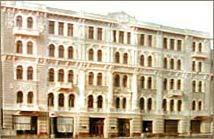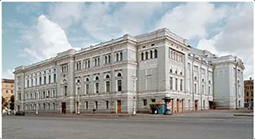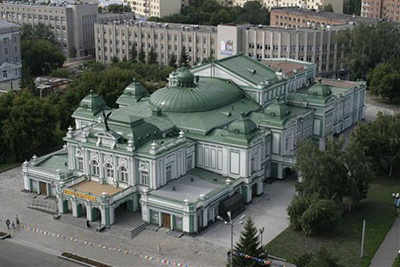Anton Petrovich Bonachich was born on January 2nd (14th), 1878 – other sources quote January 19th (31st) – in
Mariupol (Ukraine) into a family of medical doctors. His father was from Montenegro and his mother Greek. He studied at a German boarding
school and at a Russian classical language high school in Tallinn.
After that, Bonachich studied medicine. He took his first singing lessons at the conservatory in Kharkiv with P. Tikhonov, and then at the
St. Petersburg conservatory (1898–1900) with S. Gabel for singing, O. Palechek for opera and N. Solovjov for piano and composition.
 |  |
| Kharkiv conservatory | St. Petersburg conservatory |
During the 1900/1901 and 1902/1903 seasons, Bonachich sang at the opera in Kharkiv where the director was A. Tsereteli. He made his debut
as the Demon in Rubinstein's opera – as a bass-baritone, that is! From 1902, Bonachich sang as a tenor, the first time in Tbilisi as
German.
Bonachich sang in Kiev (1900 and 1904/05), Kazan (1900 and 1903), Saratov (1904), Ekaterinoslav, Tbilisi (1902), Nizhnij Novgorod and Baku
(summer 1903), in St. Petersburg (1904 at the new summer theater Olimpija). He is also said to have sung at the Mariinskij Theater in 1911,
but that's most probably wrong as the chronology of the Mariinskij does not list him. Between 1905 and 1921, he was a soloist at the
Bolshoj. In 1921/22, Bonachich was a soloist at the Omsk opera, where he served also as its director and as a producer.
 |
| Omsk opera house |
Bonachich successfully sang in Germany (Berlin, Neues Königliches Opernhaus, 1908, as a member
of the Tsereteli Ensemble, with Evgenija Zbrueva, E. M. Davydov and Medea Mei-Figner, where he
surprised everybody when he sang Sobinin and easily took three high D-flats), Italy, France and the USA (1909–1912).
Supposedly, he also sang in Monte-Carlo, but if so, it was not at the opera theater as Welsh's book
on the Monte-Carlo opera does not list him as having sung there.
Bonachich had a strong, extensive voice with a light upper register (very imposing in the falsetto), and was an
excellent actor. Thanks to the flexibility of his voice, he could switch between tenor and baritone roles.
S. Levik wrote in his book about Bonachich:
His voice did not have a nice color but it was a clever voice. He could bring a lot of colors to the interpretation of the internal life
of his role. Bonachich was an excellent musician, and a master of the recitative.
Bonachich sang lyrical, dramatic and character roles with the same success, especially in Wagner's operas.
He sang about 100 roles (among which about 42 baritone roles). He sang for example
Almaviva, Alber (Skupoj ritsar by Rakhmaninov), Paolo (Francesca da Rimini by Rakhmaninov), Don Juan (Kamennyj gost/The stone guest),
Vilem (Lesnoj tsar/The tsar of the wood by Suk), Sadko, Grishka Kuterma, the Astrologer, Golitsyn (Khovanshchina), Leontes (Wintermärchen by Goldmark),
Chopin, German (he sang the role for 20 years), Lohengrin, Siegmund (during the first performances of the opera in Moscow,
where he alternated with Lev Klementyev), Loge, Siegfried (Göterdämmerung),
Grigorij, Shujskij, Vladimir Dubrovskij, Lenskij, Onegin, Triquet, Mikhail Tucha, Tamino, Riccardo, Radames, Escamillo, José,
Raoul, Nevers, Néron, Eletskij, Demon, Roméo, Werther, Fra Diavolo, Jontek, Tannhäuser, ...and Rigoletto
which he sang after 1905 every now and then to save an evening.
His partners included: E. Azerskaja, G. Baklanov, M. Gay, S. Druzjakina, N. Ermolenko-Juzhina, L. Zvjagina, A. M. Labinskyj,
A. Nezhdanova, V. Petrov, F. Shaljapin, E. Kupera, G. Pagani, D. Pokhitonova, S. Rakhmaninova, V. Suka, L. Steinberg ....
From 1908, Bonachich started singing also operettas.
He gave concerts where he sang gypsy romances to his own guitar accompaniment.
From 1923, Bonachich dedicated himself to teaching voice: In Omsk (1923, at the musical college),
in Tomsk (1924, he was the manager of the opera class at the music school and at the same time director and conductor of the
opera studio organized by the government), and in Minsk: 1928–1930, he was manager of the Opera and Solo singing Department
and also of the chamber orchestra at the music college; 1930–1933, he was the leader of the vocal group
of the State Studio for
Opera and Ballet; 1932–1933, he was the first professor of singing at the Minsk conservatory; and in 1933 director of the
Opera and Ballet Theater. for a very short time as he died on March 22, 1933 in Minsk.
After the revolution, Bonachich organized many concerts for workers, kolkhozniks and soldiers with his students.
His students included: L. Aleksandrovskaja,
I. Balotsin, M. Denisov, S. Druker, V. Kalinovskij, R. Mlodek, and T. Nikitina.
In 1912, Bonachich recorded thirteen sides for Pathé (apparently only two are still to be found).
Bonachich was also a composer. Among his output were an operetta (Ostrov novennosti, 1909), romances and piano sonatas.
References:
A. M. Pruzhanskij: Otechestvennie pevtsy (Domestic singers) 1750–1917, part 1, Moscow 1991
A. M. Shampaner: The Russian theater, Kiev 1905, page 49–50
V. P. Shkafer: 40 years on the Russian stage. Souvenirs 1890–1930, Leningrad 1936, page 220
I. Belsa: S. V. Rakhmaninov and the Russian opera, 1947, page 139
S. Ju. Levik: Life of an opera singer, 2nd edition, 1962, page 63 & 237
S. Bronstein: Hero of the moment. Souvenirs of a spectator, 1964, page 29
Ju. D. Engel: With the eyes of a contemporary. Selected articles on Russian music, 1898–1918, Moscow 1971, page 175–176 & 278
A. A. Gozenpud: The Russian opera between two revolutions, 1905–1917, Moscow 1975, page 266–267
L. A. Ivashkov: Bonachich und the Belarussian opera scene, Mastatsvo Belarus Magazine, 1983/No.6, page 31–35
A. V. Lunacharskij: Belarus honoring the friendship between nations: State Conservatory, in: Historical essays, Minsk 1984, page 64
N. Grinev: Through the noise of old records, Melodija 1984/No.4, page 61–62
L. A. Ivashkov: A. P. Bonachich (monograph written on a typewriter), State Library Leningrad


